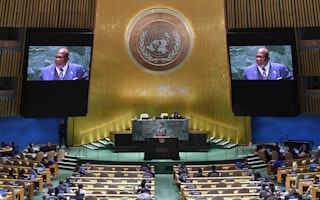The Vital Fight to Advance Equity for All
By Laura Carvalho

Inside Open Society is a look at the leaders at the Open Society Foundations who are advancing our vision to address the world’s most urgent threats to democracy and human rights at a transformative scale.
Extreme economic inequality is pernicious. It damages workers, families, and communities. It hampers sustainable economic growth. It also erodes confidence in democratic institutions, enabling the rise of authoritarianism around the world. When economic policies disproportionately benefit those at the very top, everyone else is more likely to believe that democracy cannot deliver for them.
How is inequality threatening open society around the world? Right now, there is a cost-of-living crisis globally. Middle-class households, even in the Global North, are suffering due to inflation, which slashes their purchasing power. For many living in the Global South, circumstances are even more dire; hundreds of millions of families cannot afford to buy food. In an increasingly global marketplace, most governments are unprepared to address looming automation in many industries and the urgent need to transition to low-carbon economies. Rising debt and the COVID-19 pandemic have exacerbated all other economic and social challenges. The disturbing result is more social unrest, frustration with democratic governments that do not deliver for their people, and fertile ground for authoritarians to claim.
When income and wealth disparities resulting from racial, gender, geographic and other differences are diminished, people’s daily lives improve and support for democracy rises.
I grew up in Brazil, one of the most unequal countries in the world. My life experience there and my professional work as an economist and researcher have shown me how much equity matters. When I started as an undergraduate student in Economics in 2003, the newly elected Brazilian government was starting to adopt a set of policies aimed at tackling inequalities (e.g., social benefits to the very poor, substantial minimum wage increases, and racial quotas in public universities). The vast majority of the country’s elites, including most of my own friends and classmates, were fiercely opposed to these policy measures. But my own research has contributed to the mounting evidence that these approaches were successful—not only in reducing extreme inequality, but in stimulating more robust economic growth as well.
The Open Society Foundations have renewed our historic focus on economic justice, and I am proud to lead that work, as the Foundations’ first global director of Equity. Our goal is to help build more inclusive and sustainable economies. When income and wealth disparities resulting from racial, gender, geographic, and other differences are diminished, people’s daily lives improve and support for democracy rises.
Specifically, the Foundations will:
- Advocate and provide support to governments for the adoption of equitable and sustainable policies in the areas of taxation, social protection, climate transition, drug policy, and migration.
- Engage with governments and international financial institutions such as the International Monetary Fund to reduce information, technical, and power asymmetries between debtor countries and their creditors, freeing up capital to better support the critical needs of vulnerable people.
- Encourage and scale proven approaches to reduce inequality within and between countries through the support of a diverse network of new economic thinkers and practitioners, especially from the Global South.
- Lift the voices of workers and marginalized people, which are too often drowned out when power is concentrated in multilateral spaces.
- Demand accountability for the actions of multinational corporations and financial investments that harm people and the planet.
The time is right for a renewed and reinvigorated commitment to equity. The stakes are high for the global economy and for the fight against authoritarianism. In this effort, we will collaborate with governments, the private sector, multilateral institutions, other philanthropies, and, especially, the many courageous civil society organizations that we proudly fund around the world. They have the local expertise, community relationships, and trust of the people needed to make change. We are pleased to support them in advancing equity for all people everywhere.

Laura Carvalho is a director of Programs at the Open Society Foundations.

